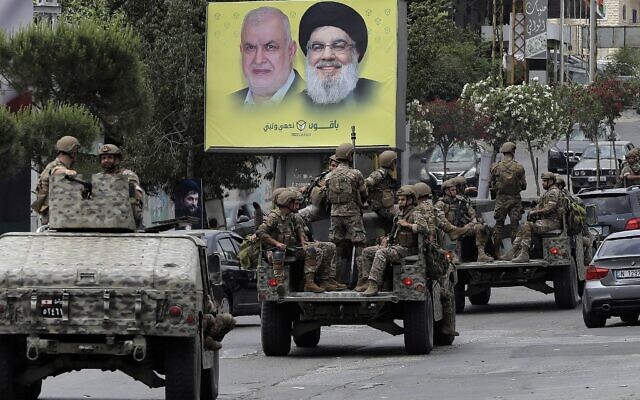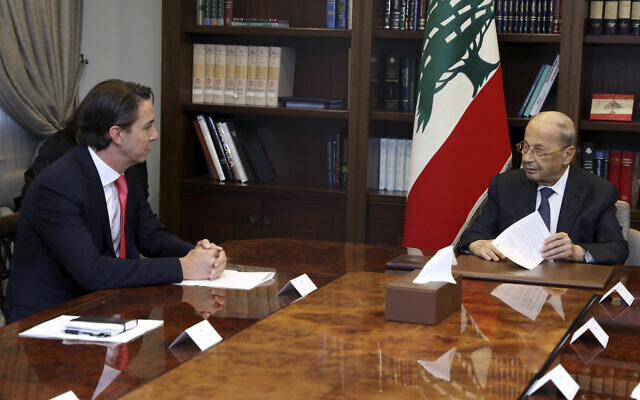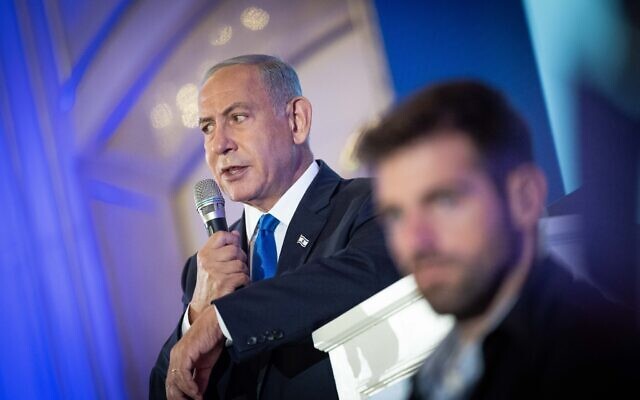The head of the Mossad spy service reportedly told government officials that the Hezbollah terror group would likely attempt an attack on Israeli-controlled installations in a disputed offshore gas field, as Jerusalem put troops in northern Israel on alert after a maritime border deal appeared to falter Thursday, sending tensions spiraling.
The warning from Mossad chief David Barnea, reported by Channel 12 news, came as another officials signaled that hope remained alive for a milestone deal between Israel and Lebanon to resolve a maritime border dispute that will allow both countries to begin pulling gas riches out of the sea.
Ministers meeting in the high-level security cabinet Thursday night agreed to give Prime Minister Yair Lapid, Defense Minister Benny Gantz and alternate Prime Minister Naftali Bennett power to deal with a possible escalation of tension or violence in the north of the country, after Israel said it would not accept Lebanon’s proposed amendments to a US-brokered deal, the channel reported.
Gantz announced Thursday evening that he had ordered Israeli troops on alert in the country’s north following talks with IDF Chief of Staff Aviv Kohavi and other security officials.
At the cabinet meeting, Barnea reportedly told ministers that Hezbollah head Hassan Nasrallah may feel pressure to act against Israel given public promises he made to stop Israel from extracting gas from the Karish field unless a deal is reached over some 860 square kilometers (330 square miles) of the Mediterranean Sea claimed by both Jerusalem and Beirut.
Get The Times of Israel's Daily Edition by email and never miss our top stories
“There’s a fear that he’ll need to show that he stands by what he says and carry out a symbolic action,” Barnea reportedly said.

Prime Minister Yair Lapid (R) meets with Mossad chief David Barnea on September 1, 2022. (Courtesy)
However, he also noted estimations that Beirut was overwhelmingly in favor of a deal, which would allow Lebanon to begin extracting gas, offering a path out of the country’s economic woes.
Nasrallah has repeatedly threatened to attack installations in the Karish field if Israel starts extracting gas from there, but has lately expressed support for US-brokered talks over the maritime border.
In July, Hezbollah launched four unarmed drones toward Karish, after Energean, a London-listed company that has the license to develop Karish, moved a rig into the play. Israel has threatened to hit back at Hezbollah if it stages another attack.

Lebanese army vehicles drive past a sign showing the images of (R to L) the leader of the Lebanese Shiite Muslim movement Hezbollah Hassan Nasrallah and the movement’s parliamentary candidate Mohammed Fneish, along a road while on patrol in the southern city of Nabatiyeh, on May 15, 2022 during the national parliamentary elections. (Mahmoud Zayyat/AFP)
Israel and Lebanon, which are officially at war, appeared to close in on a deal on the disputed gas fields late last week following years of intermittent talks, but on Thursday, Lapid rejected modifications to the proposed deal, casting fresh doubts on the viability of reaching an accord.
A senior Israeli official called Beirut’s demands “significant,” contradicting earlier assertions by Western officials that Lebanon’s objections were minor.
Despite the apparent setback, a senior Israeli official reportedly said Thursday that Jerusalem was still interested in a deal, and expressed hopes that US envoy Amos Hochstein, who is mediating the talks, would manage to smooth out the crinkles, according to the Walla news site.

Lebanese president Michel Aoun, right, meets with US Envoy for Energy Affairs Amos Hochstein, at the presidential palace, in Beirut, Lebanon, September 9, 2022. (Dalati Nohra, Lebanon’s official government photographer, via AP)
Given the political ramifications of the deal, which is supported by most officials but represents an electoral liability for those in the government, Channel 13 news reported that any agreement would likely be put on hold until after Israelis go to the ballot box on November 1.
Lapid, who is running for re-election, has been pilloried by rival Benjamin Netanyahu over the deal. Netanyahu, who leads the opposition, labeled the agreement “illegal” and accused Lapid on Monday of giving up “sovereign territory of Israel,” vowing that a potential future coalition led by him “won’t be bound by it.”

Head of the Likud party Benjamin Netanyahu attends a conference in Jerusalem, September 12, 2022. (Yonatan Sindel/Flash90)
The pro-Hezbollah daily Al-Akhbar reported Tuesday that Beirut did not agree to recognize Israel’s buoy-marked boundary — which Jerusalem unilaterally placed five kilometers off of the coast of the northern town of Rosh Hanikra in 2000 — as an international border, as well as other issues. It cited unnamed government officials.
Channel 12 news reported that Washington was attempting to convince Lebanon to back off the new demands. It cited an unnamed Israeli official who indicated that Jerusalem was unprepared to make any more concessions.
“It’s not over until it’s over, but there’s not much time left for it to succeed,” the official was quoted saying.
The White House said Thursday that talks have reached a “critical stage” and that Hochstein remains in close contact with both sides.

Lebanese protesters on a motorboat carry their national flag as they sail in front on an Israeli Navy vessel during a demonstration demanding Lebanon’s right to its maritime oil and gas fields, in the southern marine border town of Naqoura, Lebanon, Sunday, Sept. 4, 2022 (AP/Mohammed Zaatari)
The faltering of the deal has ratcheted up tensions between Israel and Lebanon.
In northern Israel, the Upper Galilee Regional Council said that business was remaining as usual. Israel is at the start of a two-week holiday period during which hundreds of thousands of domestic vacationers traditionally travel to the north of the country and tourism is a major part of the region’s economy.
“We’re in constant and close contact with security officials and will be informed of any change to the situation,” it said in a statement carried by the Ynet news site. “We invite all of Israel to come enjoy the Upper Galilee during the Sukkot holiday and enjoy all this magical region has to offer.”
However, the head of the regional council noted that many homes, schools and other buildings remained without proper protection from rocket attacks.
“There’s no argument that in the current situation, a disaster is just a matter of time,” Giora Zeltz told the news site.
Israel and Hezbollah last fought a full-scale war in 2006, though there have been a number of limited skirmishes on the border since then.

Illustrative: Sept. 2, 2019, file photo, Spanish UN peacekeepers patrol along the Lebanese-Israeli border, with the Israeli village of Metulla in the background. (AP/Hussein Malla)
The Iran-backed terror group is now thought to have tens of thousands of rockets, including missiles with precision guided systems, which can reach anywhere in Israel. Military officials have predicted that thousands of rockets could strike built-up areas daily in a future war.
The mayor of Metulla, which sits adjacent to the frontier with Lebanon, said the city was planning an emergency meeting over the alert, but that it had not come as a surprise.
“For six months we’ve been preparing for a situation in which there will be issues around Karish and it seems that’s what’s happening now,” Mayor David Azulai said. “We are prepared in Metulla, our rocket shelter situation has greatly improved, and if there’s an escalation we will be ready for any military scenario.”
Lazar Berman and Jacob Magid contributed to this report.


